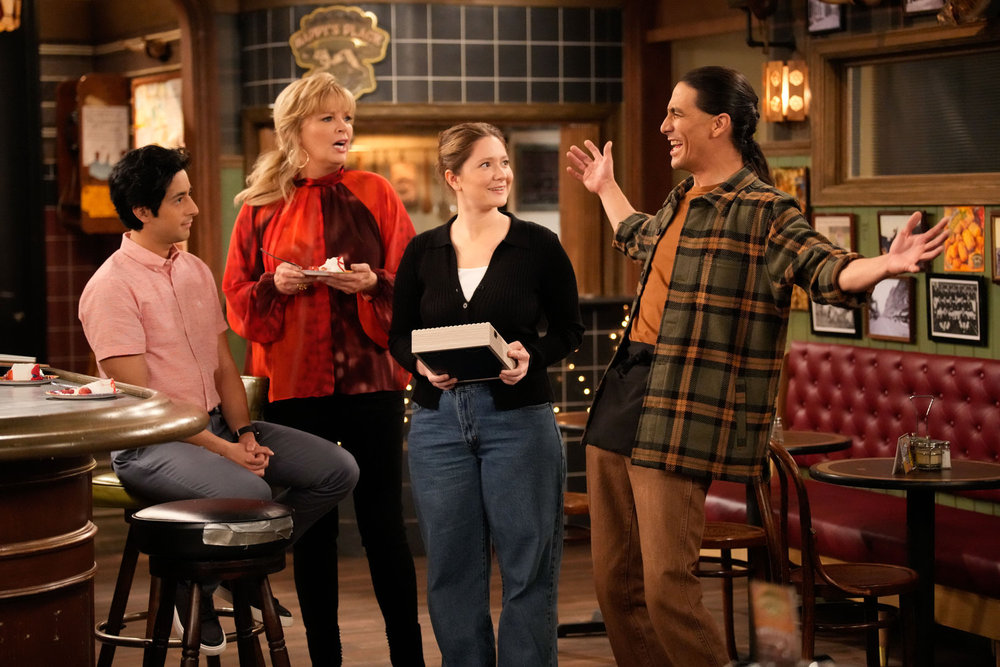There’s a big hole in McAdams’ directorial debut where our compassion for Carl should be. Carl is stuck at the beginning of “Paint” and finds himself repeatedly painting the same landmark of Mt. Mansfield (one of many ongoing jokes that would be funnier with better pacing). Such creative stasis makes way for a weak subplot about a replacement—a younger painter named Ambrosia (Ciara Renée) who follows his time slot and can fill two complete canvases in one hour, as opposed to Carl’s one. Ambrosia becomes the station’s hero, rendering the egotistical Carl into old news. A personal crisis brews within Carl, and a competition at the station begins. Suddenly his boss (Stephen Root) isn’t his champion anymore, but another person trying to push him out the door tactfully.
As “Paint” moves on from one airless sequence to the next, the annoying problem of Carl being an unamusing jerk is supplanted by other frustrations. Here’s a guy who has made a career out of painting for public access—in modern times, somehow, mind you—and also has borderline inappropriate relationships with his female co-workers. The swooning women behind the camera want to be his muse, and we see how easy it is for him to get them into his orange van (with a foldout bed inside) or on a date. That’s a big joke that this movie wants to toss into the mix, but “Paint” merely presents it, as it does so many other of its chintzy facets. This is coupled with a more sincere story that doesn’t fit—Carl’s longing for Katherine (Michaela Watkins), who once had a deeper relationship with him until something trashed it. We’re not sure how exactly the movie wants us to feel about all of this, but it feels awkward and not funny.
The world-building in “Paint” is about challenging the wholesomeness of what makes a Bob Ross—the public broadcasting station that would make his soothing paint tutorial shows a phenomenon, the little town he would become a celebrity in, and the innocence with which he presented himself. But the film distances itself from sharper predecessors like Mike Judge (“Extract“) with its bad gags and weak wordplay. One of the studio employees (Lucy Freyer’s Jenna) wants to get with Carl, but he’s hesitant, and Wilson plays him as far too naive in moments in which she’s firing out innuendos at a fondue dinner. He ends up force-feeding her meat, even though she’s a vegan. She does it for the date despite it making her feel sick, only to sprint to the bathroom later. It’s an eye-rolling sequence, but it’s one-upped by a flashback in which co-worker Wendy (Wendi McLendon-Covey) talks to Carl over a transistor radio, all so this movie can make this joke during a break-up: “Are we over-over, over?” A film that was better with tacky jokes would have killed that, but it’s too obvious here within a clunky setup.























































![5 Ways to Improve Your LinkedIn Marketing Efforts in 2025 [Infographic] 5 Ways to Improve Your LinkedIn Marketing Efforts in 2025 [Infographic]](https://imgproxy.divecdn.com/Hv-m77iIkXSAtB3IEwA3XAuouMwkZApIeDGDnLy5Yhs/g:ce/rs:fit:770:435/Z3M6Ly9kaXZlc2l0ZS1zdG9yYWdlL2RpdmVpbWFnZS9saW5rZWRpbl9zdHJhdGVneV9pbmZvMi5wbmc=.webp)
















